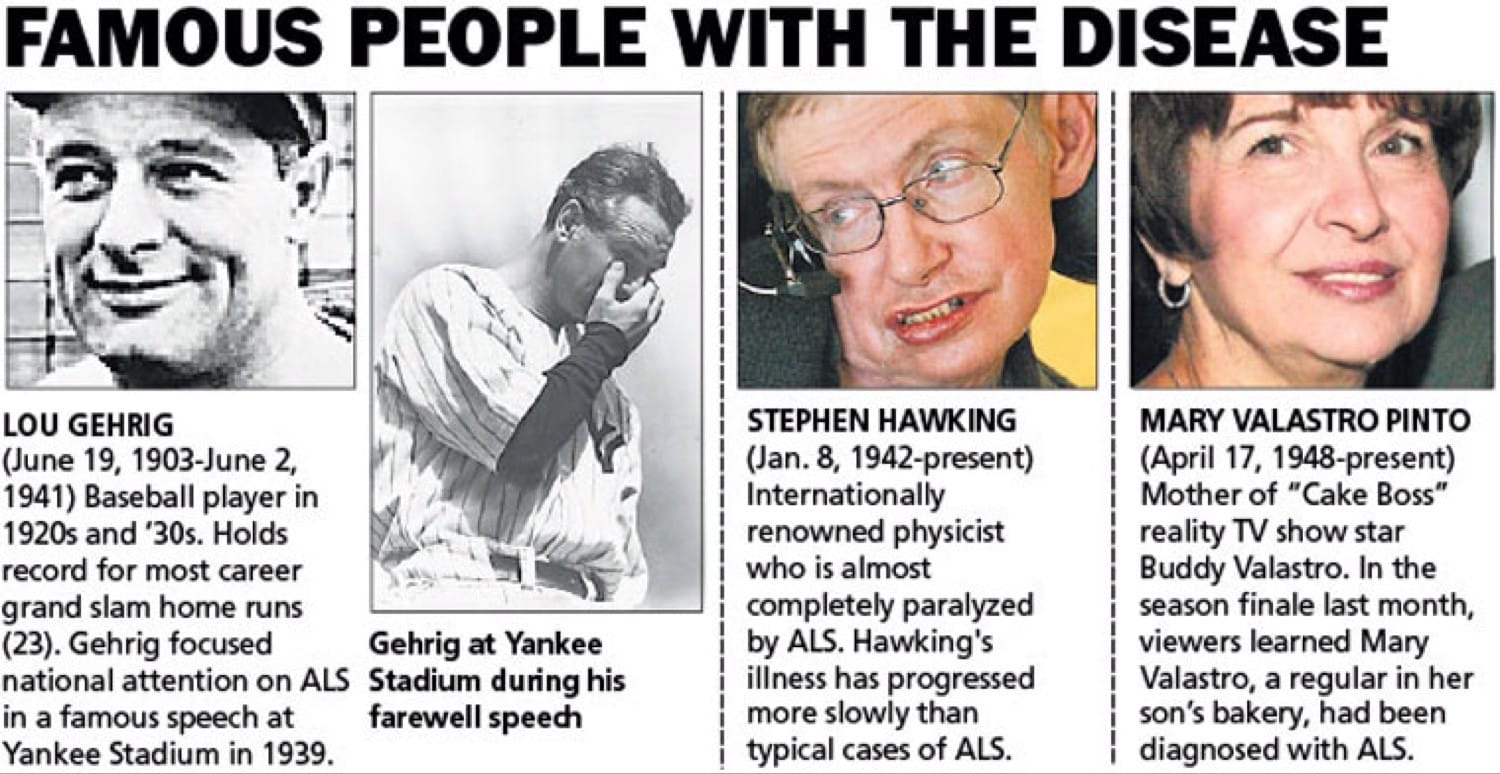When we talk about Lou Gehrig's disease, also known as Amyotrophic Lateral Sclerosis (ALS), it's important to recognize how this condition has affected the lives of many individuals, including famous personalities. ALS is a progressive neurodegenerative disease that affects nerve cells in the brain and spinal cord, leading to muscle weakness and eventually impacting the ability to move, speak, eat, and breathe. This article dives deep into the lives of famous people who battled this disease and how they have left a lasting legacy in our world.
ALS, named after baseball legend Lou Gehrig, has been brought to public attention through the stories of remarkable individuals who faced it with courage and resilience. These individuals have not only inspired millions but also contributed significantly to raising awareness about the disease and the need for research and support.
As we explore the lives of these famous personalities, we will also delve into the symptoms, causes, and treatments associated with ALS, providing a comprehensive understanding of the disease. By the end of this article, you will have a clearer picture of what ALS entails and how these inspiring figures have impacted our understanding of it.
Table of Contents
- Biography of Lou Gehrig
- Famous People with ALS
- Understanding ALS
- Symptoms of ALS
- Causes of ALS
- Diagnosis and Treatment of ALS
- Raising Awareness for ALS
- Inspiring Stories of Resilience
- Support and Resources for ALS Patients
- Legacy of Famous People with ALS
Biography of Lou Gehrig
Lou Gehrig, the man after whom ALS was named, remains one of the most iconic figures in baseball history. Known as the "Iron Horse," Gehrig played 17 seasons with the New York Yankees and set numerous records during his illustrious career. Below is a brief overview of his life and achievements:
Early Life and Career
Born on June 19, 1903, in New York City, Lou Gehrig grew up in a modest household. Despite financial challenges, he excelled academically and athletically, earning a scholarship to Columbia University. However, his career took a different turn when he joined the New York Yankees in 1923.
Major Achievements
Gehrig's achievements on the field are legendary. He played in 2,130 consecutive games, a record that stood for over half a century. His impressive batting average and home run records solidified his place in baseball history. Below is a table summarizing some of his major achievements:
| Category | Achievement |
|---|---|
| Games Played | 2,164 |
| Home Runs | 493 |
| RBI | 1,995 |
| World Series Titles | 6 |
Famous People with ALS
Beyond Lou Gehrig, several other famous personalities have battled ALS. Their stories have brought global attention to the disease and inspired countless individuals to support research and advocacy efforts.
Stephen Hawking
One of the most celebrated figures in modern science, Stephen Hawking was diagnosed with ALS at the age of 21. Despite the debilitating effects of the disease, he continued to make groundbreaking contributions to theoretical physics and cosmology. Hawking's work on black holes and the origins of the universe has left an indelible mark on science.
Pat Quinn and Pete Frates
Pat Quinn and Pete Frates, the co-founders of the Ice Bucket Challenge, played a pivotal role in raising awareness about ALS. Their efforts led to a global movement that raised millions of dollars for research and support. Both men lived with ALS and became symbols of resilience and determination.
Understanding ALS
Amyotrophic Lateral Sclerosis (ALS) is a complex neurodegenerative disease that affects motor neurons, the nerve cells responsible for controlling voluntary muscle movement. As the disease progresses, these neurons deteriorate, leading to muscle weakness and paralysis.
Types of ALS
- Sporadic ALS: The most common form, accounting for 90-95% of cases, with no clear genetic link.
- Familial ALS: A hereditary form of the disease, accounting for 5-10% of cases.
Symptoms of ALS
The symptoms of ALS can vary depending on the individual and the progression of the disease. Early symptoms often include muscle weakness, difficulty speaking or swallowing, and muscle cramps. As the disease progresses, more severe symptoms may develop, such as:
- Difficulty walking or using hands
- Slurred speech
- Difficulty breathing
- Weight loss due to muscle wasting
Causes of ALS
The exact cause of ALS remains unknown, but researchers have identified several potential factors, including genetic mutations, environmental factors, and oxidative stress. Studies suggest that a combination of genetic predisposition and environmental triggers may contribute to the development of the disease.
Genetic Factors
Approximately 10% of ALS cases are linked to genetic mutations. The most common mutations involve the C9orf72 gene, which is associated with both ALS and frontotemporal dementia.
Diagnosis and Treatment of ALS
Diagnosing ALS can be challenging due to its similarity to other neurological conditions. Physicians typically rely on a combination of physical examinations, imaging tests, and electromyography (EMG) to confirm the diagnosis.
Treatment Options
While there is no cure for ALS, several treatments can help manage symptoms and improve quality of life. These include:
- Medications such as Riluzole and Edaravone
- Physical therapy and occupational therapy
- Speech therapy and assistive communication devices
- Nutritional support
Raising Awareness for ALS
Awareness campaigns like the Ice Bucket Challenge have played a crucial role in educating the public about ALS. These initiatives have not only raised funds for research but also fostered a sense of community among patients, caregivers, and supporters.
Importance of Advocacy
Advocacy efforts are essential for driving progress in ALS research and improving access to care. Organizations such as the ALS Association and the Muscular Dystrophy Association (MDA) provide vital resources and support for individuals and families affected by the disease.
Inspiring Stories of Resilience
The stories of individuals like Stephen Hawking, Pat Quinn, and Pete Frates exemplify the resilience and determination that characterize those living with ALS. Their contributions to science, advocacy, and public awareness have inspired millions around the world.
Lessons from Their Journeys
These inspiring figures have taught us the importance of perseverance, hope, and community. By sharing their stories, they have encouraged others to embrace challenges with courage and optimism.
Support and Resources for ALS Patients
For individuals and families affected by ALS, numerous resources are available to provide support and guidance. These include:
- Support groups and counseling services
- Financial assistance programs
- Research opportunities and clinical trials
Legacy of Famous People with ALS
The legacies of famous individuals with ALS extend far beyond their personal achievements. Through their courage and dedication, they have paved the way for greater understanding, compassion, and progress in the fight against this devastating disease.
Continuing Their Mission
As we honor their memories, it is important to continue their mission by supporting ALS research, advocating for improved care, and raising awareness about the disease. Together, we can make a difference in the lives of those affected by ALS.
Conclusion
This article has explored the lives of famous people with Lou Gehrig's disease and the impact they have had on our understanding of ALS. From Lou Gehrig's legendary baseball career to Stephen Hawking's groundbreaking scientific discoveries, these individuals have left an enduring legacy of inspiration and resilience.
We invite you to join the conversation by leaving a comment or sharing this article with others. Together, we can raise awareness about ALS and support the ongoing efforts to find a cure. For more information, explore our other articles on health and wellness topics.


